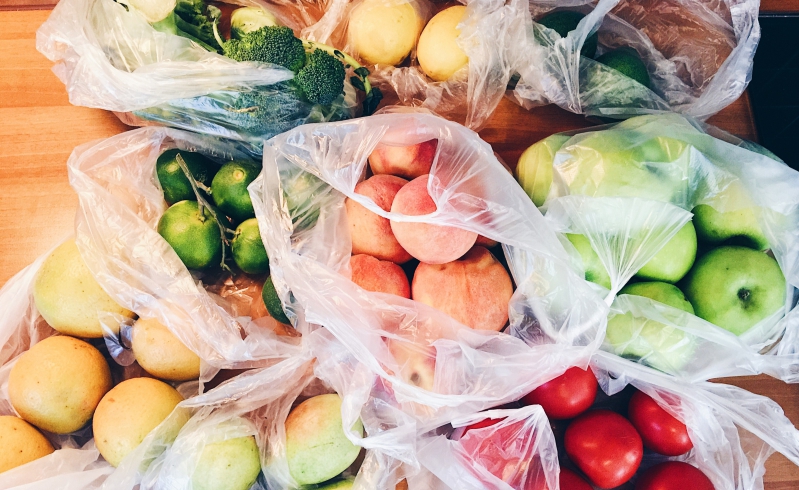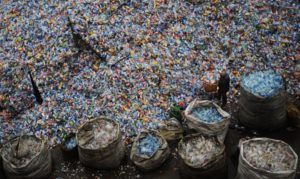
Scholars discuss policy options for regulating single-use plastic bags.
Americans use 100 billion plastic bags every year. Only about 1 percent of these bags get recycled. The other 99 billion go to landfills or become litter, which can cause harm in a number of ways. For example, plastic bags produce toxins and break down into microplastics that enter the soil and waterways. In urban areas, plastic bags can contribute to flooding by clogging storm drains.
Currently, these urban tumbleweeds are unregulated at the federal level. To fill this void, individual states and localities have taken various approaches to reducing plastic bag usage, including by imposing taxes, banning plastic bags, and creating other incentives for reusable bag use.
Washington, D.C., imposed the nation’s first plastic bag regulation in 2009, closely followed by Montgomery County, Maryland. Today, eight states—California, Connecticut, Delaware, Hawaii, Maine, New York, Oregon, and Vermont—and several localities have adopted some form of plastic bag regulation.
Although no federal plastic bag regulation exists, experts see plastic waste reduction as a bipartisan issue. Several pieces of proposed and enacted legislation relating to plastic waste management received bipartisan support during the Trump Administration. One pending bill in the U.S. Congress proposes a framework to hold single-use plastic producers fiscally responsible for recycling products after consumer use and to phase out carryout plastic bags through a tax. During the COVID-19 pandemic, however, multiple industries have increased their reliance on plastics, which has stalled momentum for the bill.
Despite this delay in federal plastic regulation in the United States, several efforts are underway to try to regulate plastic bags at the international level. Two-thirds of United Nations member states have expressed willingness to enter a multilateral agreement to reduce plastic waste, analogous to a Paris Agreement for plastics. Although the Biden Administration’s climate plan remains relatively vague on plastics reduction, several major NGOs and multinational companies, such as Coca-Cola, have indicated support for international plastic reduction negotiations.
Perhaps such bipartisan and international support for plastic bag regulation will call the federal government to action in the United States. But some environmentalists argue that regulating plastic bags in the name of combating climate change would be largely symbolic since other types of single-use plastics and food waste contribute more to greenhouse gas emissions than plastic bags. Others contend that plastic bag regulation can play an important role by creating social norms that can inspire further environmental regulatory efforts.
This week’s Saturday Seminar highlights research papers that explore various plastic bag regulations and offer possible lessons from these policies.
- Fees are more effective than bonuses at curtailing the use of plastic bags, Tatiana Homonoff of NYU’s Wagner School of Public Service argues in a recent article published in the American Economic Journal: Economic Policy. Looking at data from various grocery stores, Homonoff found that a $0.05 fee on disposable bags generated a 42 percent decrease in plastic bag usage, but a $0.05 bonus for using reusable bags had almost no impact on consumer habits. Homonoff posits that this asymmetry results from loss aversion, a behavioral phenomenon wherein individuals perceive losses, such as bag fees, more strongly than gains.
- In an article published in Ecology Law Quarterly, Sarah Fox of the Northern Illinois University College of Law suggests a novel path forward for local plastic bag regulation: state constitutional law. Local efforts to curtail plastic bag use are sometimes invalidated by reactive state legislation prohibiting local regulation. Environmental protections within state constitutions, however, may provide a mechanism for judges to find these state preemption laws impermissible, Fox argues.
- In a study published in the Marine Pollution Bulletin, Dirk Xanthos and Tony R. Walker highlight a lack of research on the effectiveness of policies regulating the use of microplastics, such as plastic bags. Xanthos and Walker explain that countries can create a cohesive international strategy by creating legislation and regulations that will account for the successes and failures of current market-based instruments enacted by various jurisdictions. To be most effective, regulators should couple research on current practices with education and outreach programs informing the public of such findings, Xanthos and Walker argue.
- By analyzing consumer responses to plastic bag regulations, Rebecca Taylor of Australia’s University of Sydney School of Economics compares outcomes of U.S. bans and taxes on the use of plastic bags. She finds that bans and fees produce similar results, both yielding decreased carryout bag consumption and increased use of reusable bags. But Taylor’s study reveals that bans may be more effective if stores do not charge more for paper bags and offer cheaper reusable bags. She argues that the types and prices of plastic bag alternatives provided will determine the most effective policy tool.
- In an article published in Natural Resources & Environment, Sarah Morath of Wake Forest Law argues for a multimodal approach to solving environmental harms caused by plastic. In a multimodal approach, a combination of private environmental governance, international agreements, and individual behavior fill the gaps in federal and state legislation. Morath emphasizes the need for entrepreneurship and collaboration between private and public entities to create a cradle-to-cradle, circular economy for plastics. She encourages businesses to implement consumer choice nudging strategies and to participate in international agreements such as the G7 Ocean Plastics Charter. In the legislative space, Morath warns that state preemption of local plastics regulation can stifle innovation.
- Plastic bag taxes may be more effective than bans, according to Tatiana Homonoff of NYU Wagner and a team of coauthors. They argue in a working paper released by the National Bureau of Economic Research that policy bans are often narrowly tailored and fail to account for close substitutes of the banned item. Homonoff and her team found that Chicago’s 2015 plastic bag ban was less effective than its 2017 disposable bag tax because the ban only accounted for thin plastic bags. During the ban, consumers used other types of disposable bags. During the tax, however, the city saw disposable bag use fall by an additional 33 percent. The team recommends that policymakers take these findings into consideration when choosing between bans and market-based policies.
The Saturday Seminar is a weekly feature that aims to put into written form the kind of content that would be conveyed in a live seminar involving regulatory experts. Each week, The Regulatory Review publishes a brief overview of a selected regulatory topic and then distills recent research and scholarly writing on that topic.



